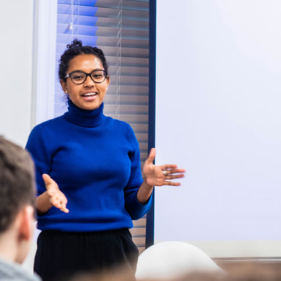Black-Jewish Relationship Series sparks dialogue, connection at Northeastern University Hillel

Students at Northeastern University’s Hillel this semester took a deep dive into the dynamics between the Black and Jewish communities, with the “Black-Jewish Relationship Series.” The goal was to give students of both communities “space to be together,” says Yeshi Mengistu, the Hillel’s Jewish Agency Israel Fellow and Director of Israel Engagement & Education.
The series aimed to equip students with tools and critical thinking skills to help them tackle big questions, such as “what our responsibilities as minority groups are, and how we can support each other, not just when something happens, but also on a daily basis,” she says.
Ultimately Mengistu hopes the series will “create dialogue and build coalitions that will strengthen our entire community.”
The series began with two foundational sessions: “How Jews Came to the United States” and “Being Black in the US – the differences between racism and anti-Semitism.” These sessions explored the histories of both minority groups in this country and their experiences, some of which are more similar than one might imagine.
Further conversations focused on the relationship between Jews and Blacks with topics such as “Alliances and Arguments between American Jews and the African-American Community” and “Jews of Color and African Americans.” In the fifth session of the series, Noah Shufutinsky, a student at George Washington University (GW), spoke about his experiences being both Black and Jewish and how he has navigated his identities in the face of racism and antisemitism.
Shufutinsky, who is majoring in Judaic Studies and has been very involved with GW Hillel and GW for Israel, says that finding a connection between the Black community and the Jewish Zionist community is something that he has struggled with, as these communities have in recent years sometimes clashed over issues concerning Israel.
To help deal with that tension, Shufutinsky turned to music – primarily Rap – to articulate his experiences and find a bridge between Jewish and African American cultures. Noah says he has experienced antisemitism from left- and right-leaning Americans and racism from society at large, and that his music, which speaks to issues like slavery and the political uses of ethnicity and race, helps him effectively bridge his identities and the communities.
Also in the series, Zehava Tesfay, who like Mengistu is an emissary of the Jewish agency of Israel, spoke of her experience of being an Israeli whose family was among the hundreds of thousands of Ethiopian Jews who made Aliyah from Ethiopia to Israel. Tesfay shared her experience of growing up as a Jew of Ethiopian origin in Israel, and her experience living in the United States as a person of color.
The “white” Israeli community had a difficult time accepting Ethiopian Jews when they first made Aliyah, Tesfay says. But Tesfay is part of the younger generation of Israelis of Ethiopian descent who have become more integrated in society and more accepted by other Israelis. Nevertheless, Tesfay says she has always felt like a minority in Israel, and has experienced discrimination stemming from her appearance and heritage.
Ironically, Tesfay says she only understood what it felt like to be part of a majority when she visited Atlanta, a predominantly Black city. Still, in most places in the United States, people assume she is an African American woman, not a Jewish-Israeli- Ethiopian woman, she adds. In fact, Tesfay says that once, she was refused service in an American ice cream store because she is Black. While Tesfay says she has faced racism in Israel, she says Israeli society is changing for the better and the community is active in making those changes.
Cassandra Barrett, a fifth-year biology and political science major who is Black and was raised Christian, joined the Black-Jewish Relations Series to “find out more about the intersection of our identities and the identities of my friends.” For Cassandra, “the biggest takeaway from the series is to ask people about their stories.” If we don’t ask people who they are, we can catch ourselves “falling into stereotypes and implicit biases that strip people of who they are. Through this fellowship,” she says, “I learned the importance of allowing people to tell me who they are.”
Avi Natan, a fifth-year chemical engineering student who participated in the Black-Jewish Relations Series, echoed Barrett’s sentiments: “It is important to hear from Black Jews and learn about their intersecting identities, because racism exists in the Jewish community and it is something that I do not think is discussed enough.”
For Natan, “my biggest takeaway from the series is to be proud of my Jewish identity, but to not let that blind me to the issues that we still must work on within the Jewish community. As a white Jew, it is easy to become complacent and ignore the systems of white supremacy that white people benefit from in the United States, because Jewish people face discrimination themselves. We must support Black Jews, fight antisemitism, and dismantle racism.”
Participants agreed that Jewish Americans, who know what it is like to be a minority, need to step into conversations that are “brave” – ones in which they may feel uncomfortable, but where the discomfort makes the conversation all the more important. According to Robert Jose, the Dean for Cultural and Spiritual Life at Northeastern, “It is so vital for our students to meet on a weekly basis, hear and learn from each other, and ultimately build bridges between the communities. We need more of this kind of dialogue.”
The Black-Jewish Relationship series was made possible in part by support from Combined Jewish Philanthropies of Greater Boston and the Israel Campus Roundtable.